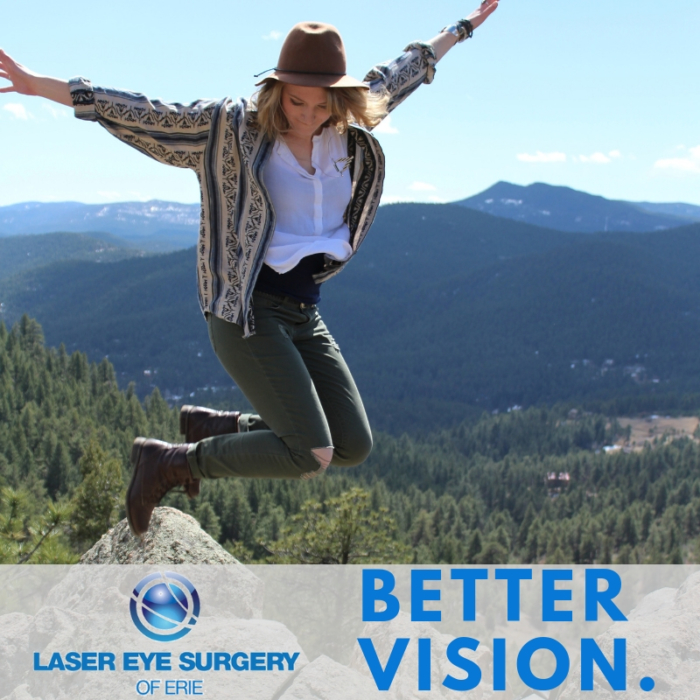Laser Eye Surgery of Erie
Beyond Seeing Clearly: What to Expect with LASIK Recovery

If you’re ready to have LASIK surgery, you’re probably focused on one thing: seeing better. Many people don’t realize that the vast majority of LASIK patients have improved vision almost immediately after their procedure. They sit up seeing the world in a whole new way and it’s very exciting.
Despite these immediate results, though, it’s also important for LASIK patients to understand that there will be a recovery phase and healing period beyond your initial procedure.
Some of the more frequent questions we get about recovery from LASIK are things like:
“Will my eyes hurt after my LASIK surgery?”
“Can I wear makeup the next day?”
“When can I work out or play sports?”
For most people, LASIK recovery is very fast and patients resume most normal activities within a day or two.
The healing period takes a little while longer, typically lasting 3-6 months during which time you should expect your vision to gradually improve. Knowing what to expect after your procedure can be helpful, so here are a few guidelines about what you might experience in the days, weeks, and months after your surgery – and what you can do to help take care of your eyes as they heal.
LASIK Recovery: The First 24 Hour
After the topical anesthesia wears off, you will likely have some discomfort after surgery. An itching or burning sensation is normal and your doctor will give you instructions about what and how much pain reliever to take
When you get home, rest your eyes for 2-4 hours and avoid any strenuous activity. You can return to your normal routine the next day. Protect your eyes by wearing sunglasses if you’re outside during the day and eye shields in bed at night
Right after the procedure, your vision will be foggy as if you opened your eyes under water. You should be able to see much better within hours of the procedure but you may have some temporary side effects as you go through the healing process. The most common is dryness. Make sure to use the lubricating eye drops your doctor gives you, as instructed, to keep your eyes moist
You may also experience halos around your eyes at night, tearing eyes, puffy eyelids, and sensitivity to light. These should all diminish within a week
If you experience severe pain at any time, contact your doctor immediately.
First Month
Your doctor will want to see you a day or two after your surgery to test your vision and examine your eyes to make sure your LASIK recovery is going well.
It’s very important that you do not rub or touch your eyes for a week. Your eyes will be sensitive and you don’t want to disturb the healing corneal flap.
You should be able to shower the day after your surgery, just be sure to keep soap and any chemicals out of your eyes.
Avoid any water that could be contaminated. This includes hot tubs, swimming pools lakes, rivers and the ocean, for at least a week. Don’t wear eye makeup such as liner or mascara, use application brushes, or apply eye creams for at least a week. This is to help prevent infections.
You can start exercising after the first week. If you lift weights, use machines for the first week before returning to free weights. Wear goggles for swimming laps in the pool.
Stay away from contact sports, such as football for a week and wear sports goggles after that for a month – you don’t want to risk getting poked in the eye.
Three-Six Months
If you have severe myopia (nearsightedness), your eyes may take longer to heal. Your doctor should have provided you with your recovery plan, which may include wearing glasses for a short period of time as your eyes heal.
Your eyes will still be healing during this time. Attend all your follow-up visits with your eye doctor so they can continue to monitor your vision and eye health.
Working with your LASIK surgeon throughout the recovery and healing process is essential to an overall good outcome, so keep him or her updated on how you are doing and ask any questions you may have about your vision.
Most patients have a short recovery time and are very happy with the results.
Just remember: having LASIK or any vision correction procedure doesn’t end your relationship with your eye doctor; you will still need to have regular eye exams. LASIK won’t prevent your eyes from changing as you age, so staying on top of your eye health is important.
Think you’re ready to have LASIK? Schedule a free consultation today!
(source: American Refractive Surgery Council)

